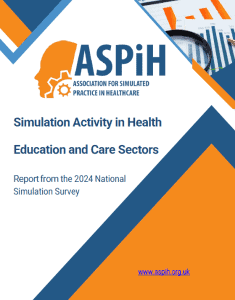2024 Simulation Survey Report
2024 Simulation Survey Report: A Decade of Progress and Persistent Challenges in Healthcare Simulation
The Association for Simulated Practice in Healthcare (ASPiH) has published its anticipated 2024 Simulation Survey Report, offering a comprehensive overview of simulation activities and practice across the UK and Ireland. The report builds on the foundational 2014 survey and provides critical insights into the evolution, impact, and future direction of simulation in health and social care.
The 2024 report gathered responses from 107 survey responses and five focus groups with representatives from NHS Trusts, Higher Education Institutions, Primary Care, and Commercial Organisations. The findings reveal both significant advancements and enduring barriers in the integration of simulation into healthcare education and delivery.
Key Findings
- Simulation is rarely prioritised in organisational strategy.
- Underfunding and insufficient contracted time for simulation educators persist.
- Access to faculty development is inconsistent and often unfunded.
- Use of XR, VR, and AI is growing but hindered by cost and limited evidence.
- Impact evaluation remains largely anecdotal, with few systematic measures in place.
Call to Action
ASPiH urges stakeholders to:
- Embed simulation in workforce plans and align with regulatory bodies (NMC, GMC, HCPC).
- Develop national funding models to ensure the sustainable development of simulation practices.
- Create modular faculty development pathways and regional simulation hubs.
- Promote the wider adoption of human factors frameworks like SEIPS.
- Invest in scalable immersive technologies and shared procurement strategies.
- Establish a national repository for impact case studies and evaluation tools (which report against Return on Investment and Return on Excellence frameworks).
Expected Benefits
Through implementing the recommendations in this report, it is intended that the conditions will be created whereby simulation is recognised as a strategic priority which accrues recurring and sustainable funding and infrastructure. Simulation will be recognised as an activity which supports enhanced interprofessional learning and the evidence-based reporting of impact which improves patient outcomes through enhancing the practice of healthcare teams.
What’s Ahead?
Join us in Bournemouth for ASPiH 2025, where these themes will take centre stage. They’ll shape the conversations, sessions, and insights at our annual conference this November, it’s an event you won’t want to miss.

